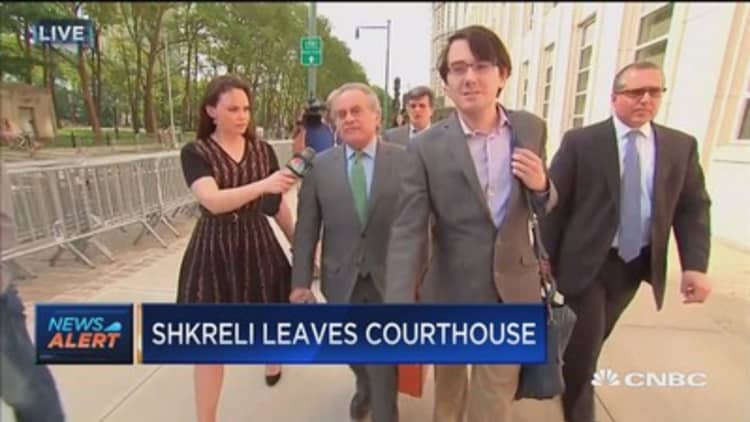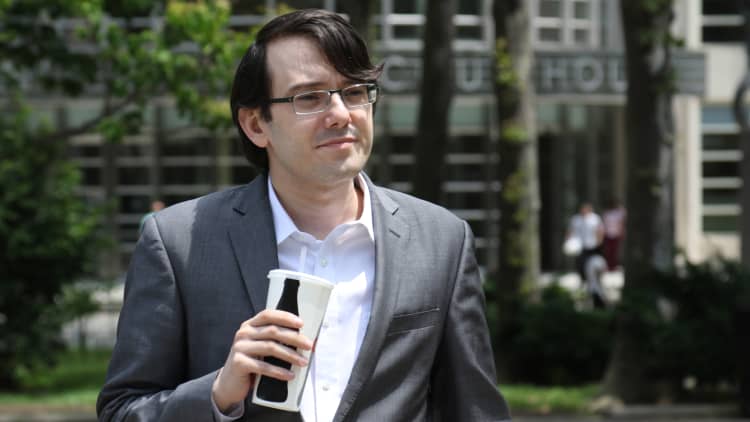
"Pharma Bro" Martin Shkreli, during a surprise visit with reporters covering his fraud trial Friday, criticized the people prosecuting him as the "junior varsity," claimed he never considered taking a plea deal and said people "blame me for everything."
Shkreli also griped about news headlines regarding his case, and teed off on a young woman who had testified he for almost a year dragged out redeeming her $435,000 investment in his hedge fund, saying she wasn't a "victim."
And Shrkreli said that several documents discussed at the trial, which raised questions about his honesty with investors, were prepared by other people.
"Do I want to exonerate myself?" he asked a small group of journalists when asked if he had desired to have his day in court.
"Yes."
He only stopped talking and left when his high-powered lawyer Benjamin Brafman peered in the room and asked, "Martin, can I talk to you for a minute?"
Later, Brafman said would prefer Shkreli not conduct any more impromptu press conferences "because sometimes he doesn't have a filter."
"I'm hoping he doesn't do it ever again," Brafman told reporters.
At the end of the day's session, before leaving court, Shkreli told one reporter "I have to be very careful about who I talk to. I might get into trouble."
And Shkreli said to a sketch artist, "You're talking to 'Rain Man.' I remember everything."
The "Rain Man" reference was to Brafman's blistering opening argument, during which he said Shkreli's business colleagues used the name of that Tom Cruise movie behind his back because it featured an autistic savant, played by Dustin Hoffman. Those colleagues supposedly suspected the highly intelligent Shkreli also might be autistic.
Shkreli's unexpected remarks came during the lunch break of his securities fraud trial in Brooklyn, NY, federal court.
He is charged with looting millions of dollars from Retrophin, the publicly traded drug company he founded. Prosecutors claim he used the money to repay to investors whom allegedly defrauded at two hedge funds he had run, in addition to paying off personal debts.
Shkreli walked into a courtroom that is on the same floor as the one where his trial is being conducted, and saw several reporters. The room has an video and audio feed of the trial for spectators who don't have seats in the main courtroom.
"Welcome," one reporter said when she saw Shkreli.
The 34-year former pharmaceuticals executive then began talking freely for about five minutes.

Shkreli first mentioned that a friend of his had been in the the trial's so-called "overflow" room earlier in the week, and tried to sit on the judge's bench.
When a reporter asked Shkreli what he thought of the trial's opening arguments on Wednesday, he shot back, "How do you think they went?"
Shkreli then suggested that his lawyer Brafman, who gave an impassioned opening, had far outclassed assistant United States Attorney G. Karthik Srinivasan, who argument was more workman-like.
Shkreli several times mentioned that Srinivasan had joined the prosecutor's office in the Eastern District of New York only two years ago.
He also pointed out that Srinivasan before that had been an associate at the Manhattan law firm Paul, Weiss, Rifkind.
When a CNBC reporter noted that the Eastern District is a well-regarded prosecutors' office, one which as late as 2015 had been led by former U.S. Attorney General Loretta Lynch, Shkreli scoffed.
He then called the Eastern District the "junior varsity."
There is a long-standing intramural rivalry between the U.S. Attorney's Office for Eastern District of New York — which encompasses Brooklyn, Queens, Staten Island and Long Island — and prosecutors in the Southern District of New York, whose ambit includes Manhattan and its Financial District.
In New York's legal world, many see the Southern District as the more elite of the two, a fact that Shkreli seemed keenly aware of.
John Marzulli, a spokesman for the United States Attorney's Office for the Eastern District, declined to comment on Shkreli's scornful remarks.
Shkreli also suggested that Winston Paes, who had been the lead prosecutor in the case, chickened out of taking it trial, because he had accepted a job several months at the large Manhattan firm Debevoise & Plimpton.
"Why would you walk out on the biggest case of your life?" Shkreli asked.
Paes, through a colleague, declined to comment to CNBC.
Asked if he thought Brafman's opening argument was worth $4 million that has supposedly been paid to that attorney's law firm, Shkreli disputed the accuracy of that amount. He also said the reporter who asked about it always gets facts wrong.
But a 10-Q filing in May by Retrophin, which ousted Shkreli in 2014, says he claimed the company owed him $5 million in legal expenses that he had incurred in defending both the criminal case and a related civil case by the Securities and Exchange Commission.
Retrophin, according to the company's filings, to date has advanced $2.8 million in pre-trial fees for Shkreli's lawyers, and $2 million in trial fees, for a total of $4.8 million.
At the same time, Retrophin is suing Shkreli for allegedly ripping off the company, is and cooperating with federal authorities in their cases against him.
Brafman, during a hearing last week, said his firm has been paid $800,000 less than the $4.8 million tally. The difference between the two amounts is $4 million.
Shkreli on Friday said he thought the trial, which was in its third day since jurors were seated, was going well for the defense.
But he bemoaned the headlines about the testimony of Sarah Hassan, who invested $300,000 of her own money in his hedge fund in 2011.
Shkreli complained that those headlines did not highlight the fact that she ended up getting a total of $1.3 million in cash combined with the proceeds of sales of Retrophin stock given her. Her own family's hedge fund, which she manages, netted even more from selling Retrophin stock it had acquired as a result of an initial $125,000 stake in the company.
"How can a victim make $2.7 million?" Shkreli asked. "She's not a victim."
But Hassan had testified that Shkreki for almost a year stalled in redeeming her personal investment stake — which he claimed had grown to $435,000 — after she asked to be paid out upon learning he was closing that MSMB Capital.
She also said Shkreli surprised her by telling her that he had, without getting her permission, used her personal money at MSMB to capitalize the start up of Retrophin.
Shkreli told reporters Friday that he believed jurors were most impressed not by Hassan's complaints about the long delay in getting her money, but by the fact that she made "four times" her investment.
"I made nothing" from MSMB Capital, Shkreli added.
"They blame me for everything," Shkreli said, apparently referring to prosecutors and his other critics.
"Blame me for capitalism," Shkreli said. "Blame me for EpiPen."
Several prospective jurors earlier this week were excused from consideration because they incorrectly believed Shkreli had raised the price of the anti-allergy device EpiPen.
In reality, Shkreli drew widespread public scorn in 2015 for hiking the price of an anti-parasite drug named Daraprim by more than 5,000 percent while serving as CEO of Turing Pharmaceuticals.
Shkreli also told reporters that he did not prepare tax documents or Retrophin marketing documents that Hassan testified about on Thursday. Other people did that, he said.
Hassan had testifed that Shkreli dragged his feet in giving her tax documents related to her investment in his hedge fund, and that when she received them they mistakenly listed her father's name as part of the investment.
Fred Hassan, her dad and a well-known pharma executive, also was listed as a member of Retrophin's board of directors on a pitch presentation assembled when the company was being created, Sarah Hassan said.
Fred Hassan said he never invested in Shkreli's hedge fund, nor did he have any role as a director, adviser or investor in Retrophin. Instead, Hassan and his daughter testified, Sarah Hassan invested $125,000 from the family's own hedge fund, DynaGrow, in Retrophin.
More than 90 percent of DynaGrow's assets belongs to Fred Hassan and his wife.
Shkreli played coy and declined to answer a reporter when asked if prosecutors had offered him a plea deal. But he noted that most federal criminal defendant plead guilty instead of going to trial.
When asked directly if he had turned down any offer from prosecutors, which likely would have included a reduction in the number of criminal counts he would have pleaded guilty to, Shkreli said he had.
Brafman, Shkreli's lawyer, told CNBC as he walked outside of court at the end of the day, "I really think Martin is not going to be speaking to you guys again if he listens to me."
"I don't think anything Martin says by now is going to affect the case one way or the other, but I would very much appreciate it if he did not talk to the press because sometimes he doesn't have a filter," said Brafman.
As Bradfman spoke, Shkreli walked by his side, grinning broadly.


